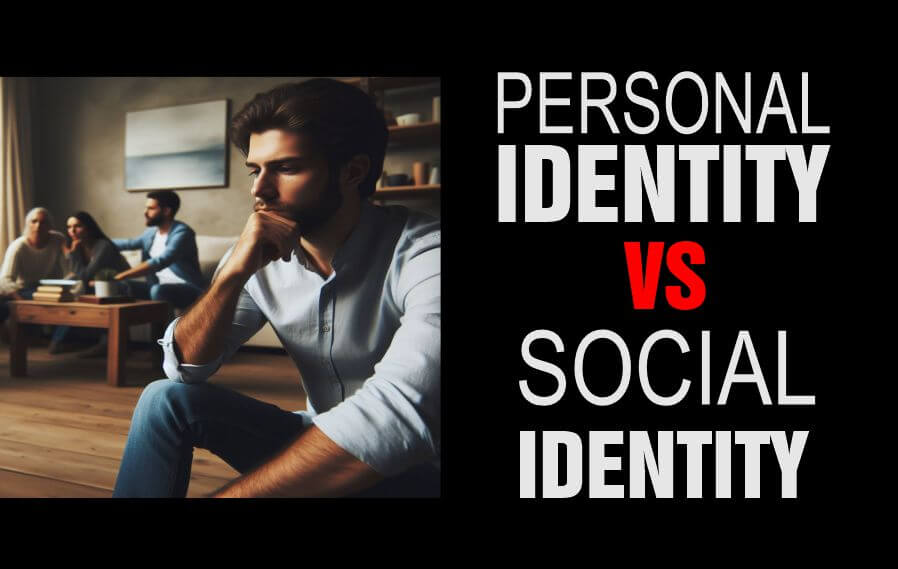Last updated on March 10th, 2025 at 06:38 am
Personal identity vs social identity, who defines you? Your inner beliefs and external roles shape a dynamic self. Discover how these identities interact and influence your life.
Understand the conflict of personal identity vs social identity as you strive to maintain selfhood in a society that expects more from you.
Personal identity is the sum of your values, beliefs, and experiences, everything that defines you as an individual.
Social identity, on the other hand, stems from your connections to groups like family, nationality, religion, and profession.
Understanding these two aspects of identity is key to recognizing how you perceive yourself and how others see you.
While personal identity is built from within, social identity is shaped by the groups you belong to and the expectations they carry.
These identities interact constantly, sometimes aligning perfectly and other times creating internal conflict.
By exploring their differences, you’ll gain a clearer view of how identity works in shaping thoughts, behavior, and relationships.
Related: The Basics of Identity
Related: What Determines Identity Diffusion?
Personal Identity: The Core of Who You Are

Personal identity is your unique fingerprint in the world. It consists of traits, values, and life experiences that define you as an individual. It covers your personality traits, passions, interests, and aspirations.
This identity forms through self-reflection, personal choices, and the lessons learned along the way.
Key Components of Personal Identity
- Beliefs and Values: These are the guiding principles that influence your decisions and moral compass. Whether shaped by upbringing, experiences, or introspection, they define what you stand for.
- Personality Traits: Your temperament, preferences, and tendencies contribute to your individual character. Are you introverted or extroverted? Analytical or creative? These traits form an essential part of your identity.
- Life Experiences: Every challenge, achievement, and turning point shapes who you are. Your experiences refine your self-perception and contribute to your sense of identity.
How Personal Identity Develops
Personal identity evolves through self-awareness and life events. As you grow, you refine your beliefs, set goals, and adjust perspectives.
Unlike social identity, which adapts based on external expectations, personal identity remains a consistent internal compass, guiding your actions and responses.
Related: Understanding Identity Crisis
Social Identity: Your Role in the World
While personal identity focuses on what makes you unique, social identity connects you to the groups you belong to.
This aspect of identity is shaped by cultural, professional, and societal influences.
Components of Social Identity
- Group Membership: Whether it’s your nationality, profession, religion, or hobby group, being part of a collective shapes how you see yourself and how others perceive you.
- Cultural and Societal Expectations: Every society has norms that influence behavior. These expectations can shape how you act in different social settings.
How Social Identity is Formed
Social identity develops through interactions with others. From childhood, you learn societal norms, adapt to cultural traditions, and align with group behaviors.
This identity is flexible, shifting as you move through different social environments.
Related: Understanding Identity Moratorium
Key Differences Between Personal and Social Identity
1. Internal vs. External Formation
- Personal identity comes from within, shaped by experiences and self-reflection.
- Social identity is influenced by external factors, such as culture, group affiliations, and social norms.
2. Uniqueness vs. Collective Identity
- Personal identity highlights what makes you different from others.
- Social identity emphasizes your connection to a group and shared characteristics with its members.
3. Consistency vs. Adaptability
- Personal identity remains relatively stable over time, though it can evolve through introspection.
- Social identity is fluid, changing based on group membership and societal expectations.
| Key Differences | Personal Identity | Social Identity |
|---|---|---|
| Internal vs. External Formation | Comes from within, shaped by experiences and self-reflection. | Influenced by external factors like culture, group affiliations, and social norms. |
| Uniqueness vs. Collective Identity | Highlights what makes you different from others. | Emphasizes connection to a group and shared characteristics. |
| Consistency vs. Adaptability | Remains relatively stable over time but evolves through introspection. | Fluid and changes based on group membership and societal expectations. |
How Personal and Social Identities Interact
Your personal and social identities don’t exist in isolation, they influence each other constantly.
A strong personal identity can help you maintain individuality within social groups, while social identity provides a sense of belonging and purpose.
Examples of Interaction
- Career Choices: You may identify personally as a free spirit but work in a structured corporate setting. Balancing these identities can lead to internal tension or motivation to adapt.
- Cultural Influence: Someone raised in a traditional household may develop personal beliefs that differ from cultural expectations, creating a push-and-pull dynamic between personal and social identity.
- Social Roles: A parent may personally value independence but feel the weight of societal expectations to be nurturing and selfless.
Real-World Examples of Identity Conflicts
Identity conflicts arise when personal and social identities clash. These tensions can impact mental well-being and decision-making.
1. Gender Identity and Societal Expectations
A person who identifies as non-binary may struggle with societal norms that enforce a strict male-or-female identity. The disconnect between personal identity and social expectations can create emotional stress and the need for self-advocacy.
2. Career vs. Passion
An individual passionate about music but working a high-pressure corporate job may feel torn between financial stability and artistic fulfillment. Their social identity as a professional may overshadow their personal identity as a creative, leading to frustration.
3. Cultural Expectations vs. Personal Beliefs
Someone from a traditional background may feel pressured to follow customs that don’t align with their personal values.
Whether it’s arranged marriage, career choices, or religious practices, these conflicts can lead to internal struggles and external tensions.
Also Read: What Is Identity Formation?
Finding Balance Between Personal and Social Identity
Understanding your identity requires balancing self-awareness with social connections. Here are ways to maintain harmony:
- Define Your Core Values: Clarifying what matters most to you can help you stay true to your personal identity, even in socially demanding situations.
- Adapt Without Losing Yourself: Being part of a group doesn’t mean you have to abandon personal beliefs. Find ways to integrate your values while respecting group norms.
- Surround Yourself with Supportive Communities: Seek environments that align with both your personal and social identities. Whether it’s a career path that fits your passion or a community that shares your values, finding balance is key.
- Practice Self-Reflection: Regularly assess whether your actions align with your true self. Journaling, meditation, or honest conversations can help bridge gaps between personal and social identity.
Related: Understanding Identity Foreclosure
Frequently Asked Questions
What is the difference between personal identity and social identity?
Personal identity pertains to an individual’s distinct characteristics, while social identity encompasses the influence of group affiliations and societal roles on one’s self-concept and behaviour.
What is personal identity?
Personal identity refers to an individual’s unique characteristics, beliefs, and values that distinguish them from others and shape their self-concept.
What is social identity?
Social identity encompasses the aspects of an individual’s identity that are derived from their membership in social groups, such as culture, religion, or nationality.
How do personal and social identities intersect?
Personal and social identities intersect as individuals navigate their unique traits within the context of societal norms, cultural expectations, and group affiliations.
Conclusion
Your identity is a blend of personal beliefs and social influences. While personal identity defines who you are at your core, social identity connects you to the world around you.
Understanding both helps you navigate relationships, career choices, and cultural expectations with clarity and confidence.
By recognizing how these identities interact, you can create a balanced sense of self,one that honors your individuality while embracing the groups you belong to.
The key lies in self-awareness, adaptability, and staying true to what matters most to you.
References:
Pyo Merez (PsyD) is a distinguished adolescent and adult psychologist at the forefront of mental health advocacy.
With expertise in cognitive and developmental psychology, focusing on social relationships, cultural contexts, and individual differences, Pyo has dedicated his career to empowering adolescents and adults.
As a sought-after speaker and panelist, Pyo shares invaluable insights on issues affecting young people, contributing to a deeper understanding of mental health and well-being in today's society.


